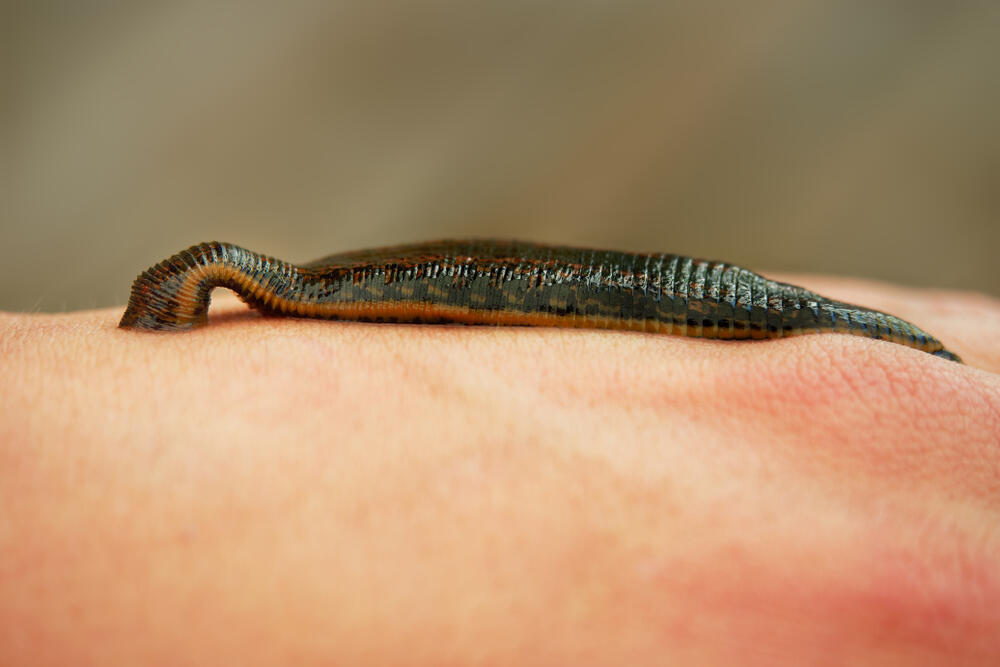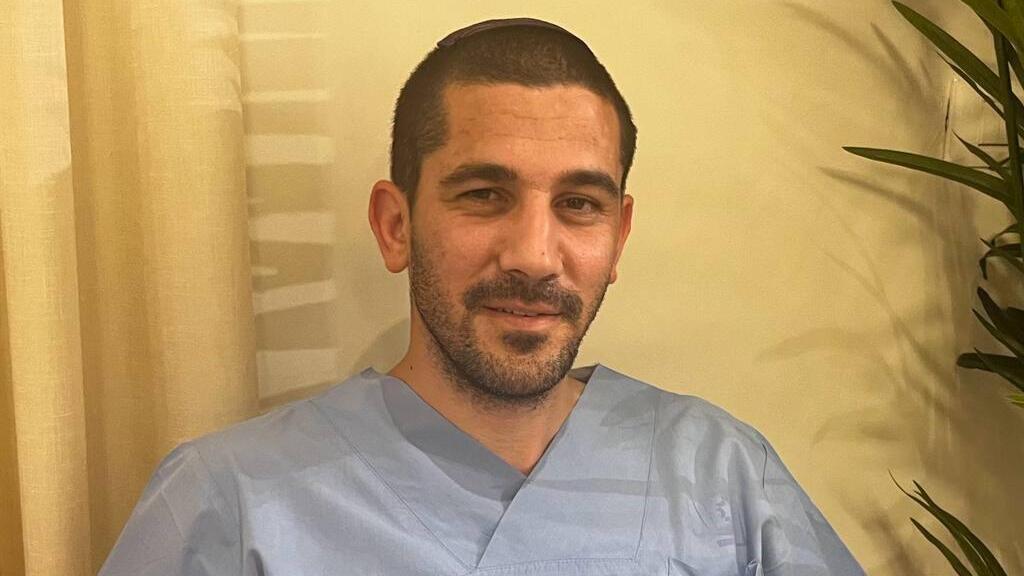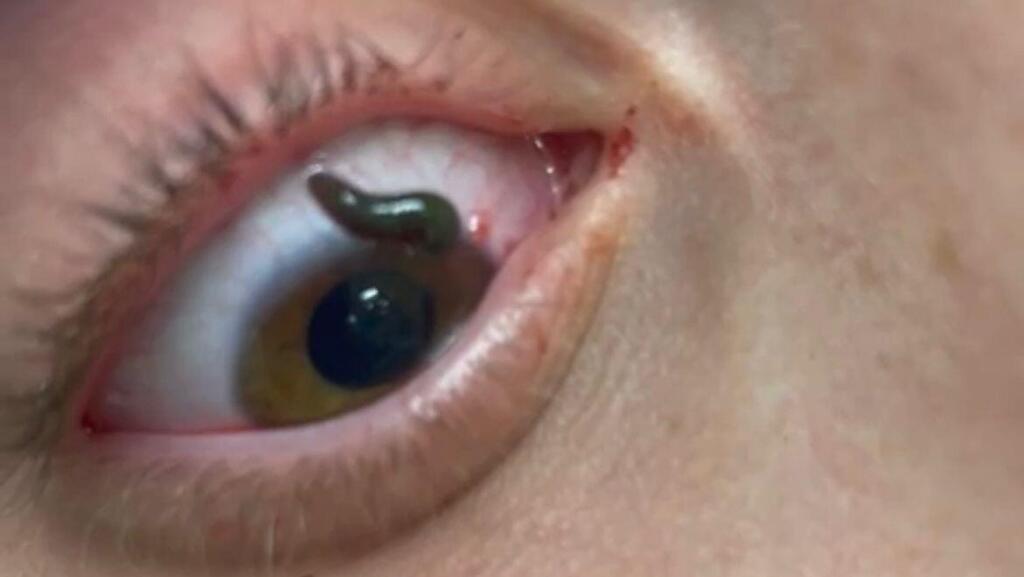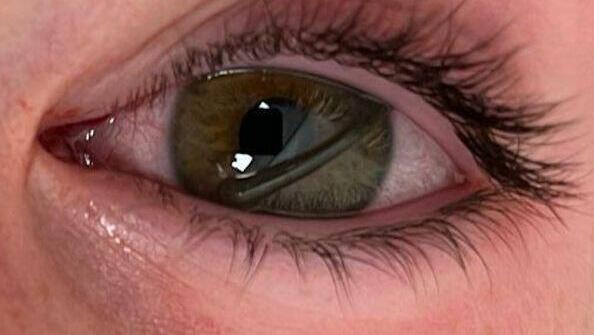Getting your Trinity Audio player ready...
Disclaimer: This article contains graphic images that could be unnerving to some.
Two children were recently treated at Jerusalem's Shaare Zedek Medical Center after leeches entered their eyes while swimming in a natural spring, causing bleeding. Doctors successfully removed the leeches with tweezers, preserving the children's vision.
More stories:
The first case involved a ten-year-old child who arrived at the hospital's emergency room complaining about irritation in his eye, discomfort and difficulty in opening it. His father noticed a black spot attached to the eye, and after unsuccessful attempts to rinse it, he decided to rush his son to the hospital.
"We saw an unusual image of a leech stuck to the eye's surface," explains Dr. Elad Ziv On, an ophthalmology postgraduate resident at the hospital. "On one side, you could see the leech's teeth attached to the eye, and on the other side, you see its tail moving."
"The child had difficulty opening his eye, and his vision was also impacted. We administered anesthetic drops into his eye and, with the help of tweezers, I removed the leech," he added.
The leech's teeth are anchored to the organ it adheres to while releasing anticoagulants. "The substances released by the leech cause irritation, and its bite remains for a long time. Therefore, it's not possible to rinse the leech off; it must be carefully removed using surgical tweezers," Dr. Ziv On explains.
The leech caused bleeding to the child's eye, but the patient was discharged from the hospital in good condition and received treatment with antibiotics and steroids. He experienced blurred vision for about two weeks, but eventually made a full recovery. "Without early detection and treatment, there's no doubt that his vision would've been impaired."
In another case that occurred last week, a six-year-old boy arrived at the hospital after swimming in the same spring, similarly experiencing blurred vision and an irritating sensation in the eye.
Dr. Maria Tzasler, a resident physician at the hospital, identified the leech and removed it. The child was discharged from the hospital after treatment and sent home with instructions for a follow-up appointment.
An ocular leech bite is considered rare worldwide. However, in Israel, there have been cases reported of such incidents in people who swam in springs and suffered bleeding from their eyes.
One such case took place in 2005 when a 45-year-old man complained of pain and breathing difficulties. A leech was found in his throat after he drank water from a natural spring while hiking. He arrived at the hospital after the leech began to swell in his throat and choke him.
In another case in 2008, a leech was found in a man's genitals after he bathed naked in a spring in the Jordan Valley. The leech entered his urethra, causing bleeding. Since the leech releases both irritating and anesthetizing substances, the man didn't feel any pain.
Leeches are annelid worms, with 600 known species known worldwide. Some feed on other worms or insects, while others consume organic matter. Others are parasites that suck the blood of mammals, birds and fish. Leeches are found in humid regions like jungles or rainforests, as well as in water springs.
In the past, leeches have been used in traditional medicine to treat fatigue or back pain. Today, leeches are used in conventional medicine, chiefly in skin grafts for plastic surgeries. The leech secretes an anticoagulant substance that prevents the body from rejecting the implant.
"While leeches have been used in the past in traditional medicine, they can be dangerous," explains Prof. David Tzadok, director of Shaare Zedek Medical Center's Ophthalmology Department.
"Leeches suck blood, secrete anticoagulant agents and can cause local bleeding and infection. Swimming in unregulated springs can lead to leech bites and potential infection in other parts of the body. When leeches enter the respiratory system, they can pose a life-threatening risk," he said.
"We recommend avoiding swimming in unregulated water springs that could serve as breeding grounds for amoebas, leeches, parasites and bacteria. In our ophthalmology department, we've treated all types of infections caused by these organisms, which can lead to severe discomfort and even vision impairment," he added.
"If you must swim in such springs, it's important to wear goggles, avoid swallowing water or drinking from them, and it's best not to swim naked."





